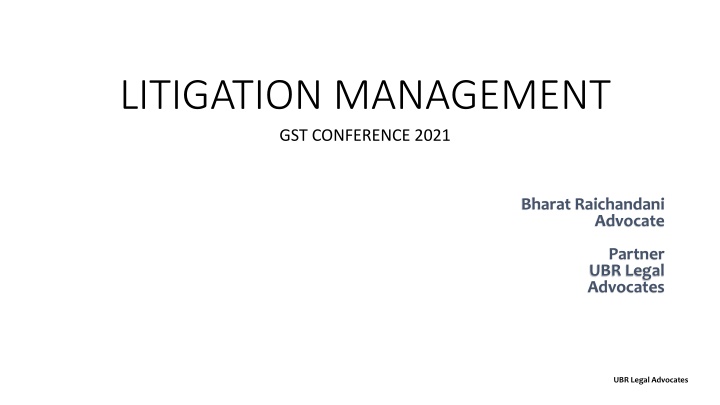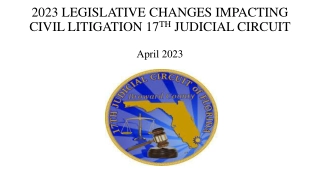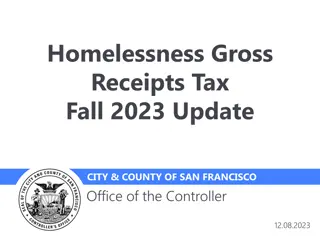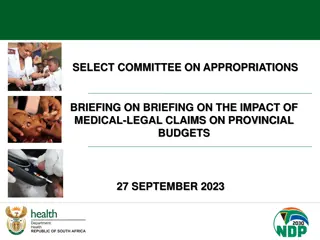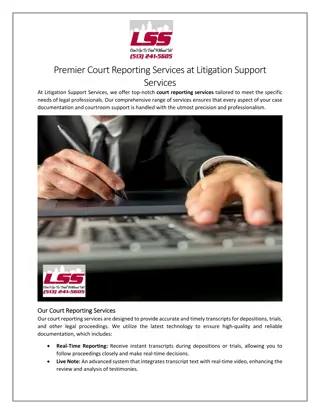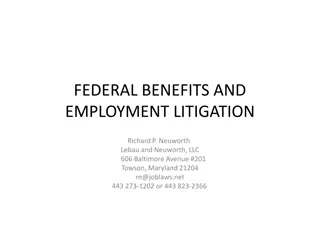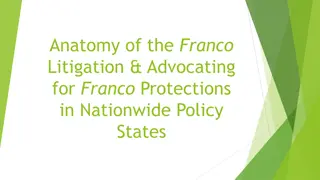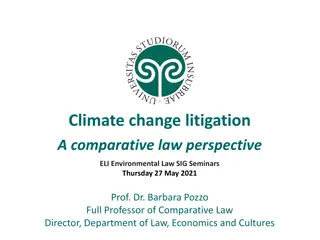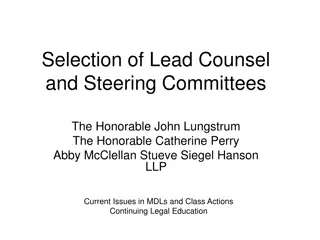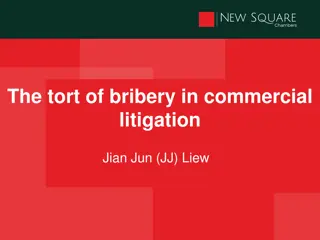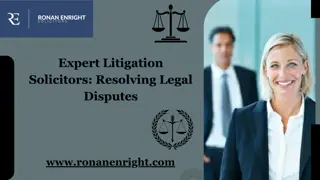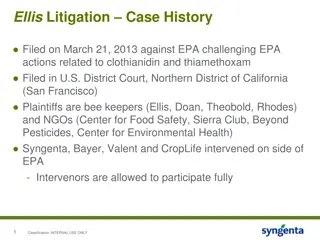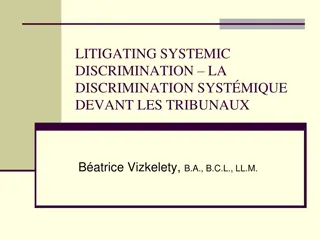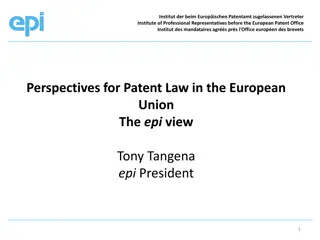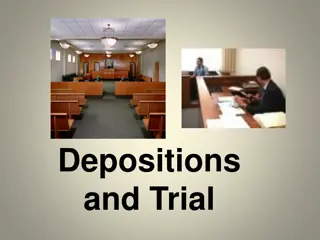LITIGATION MANAGEMENT
With a focus on litigation management related to GST, this content delves into the power of inspection, search, and seizure under Section 67, safeguards, cross-empowerment by authorities of State and Central Tax, and reasons to believe under Section 69 & 70 in the context of Indian tax laws.
Download Presentation

Please find below an Image/Link to download the presentation.
The content on the website is provided AS IS for your information and personal use only. It may not be sold, licensed, or shared on other websites without obtaining consent from the author.If you encounter any issues during the download, it is possible that the publisher has removed the file from their server.
You are allowed to download the files provided on this website for personal or commercial use, subject to the condition that they are used lawfully. All files are the property of their respective owners.
The content on the website is provided AS IS for your information and personal use only. It may not be sold, licensed, or shared on other websites without obtaining consent from the author.
E N D
Presentation Transcript
LITIGATION MANAGEMENT GST CONFERENCE 2021 Bharat Raichandani Advocate Partner UBR Legal Advocates UBR Legal Advocates
POWER OF INSPECTION, SEARCH & SEIZURE UNDER SECTION 67 Who Inspect? can Inspection can be carried out by an officer of CGST/SGST only upon a written authorization given by an officer of the rank of Joint Commissioner or above Suppressed any transaction of supply; Suppressed stock of goods in hand; Claimed excess input tax credit; Contravened any provision of the CGST act to evade tax; A transporter or warehouse owner has kept goods which have escaped payment of tax or has kept his accounts or goods in a manner that is likely to cause evasion of tax. Under circumstances inspection can be done? what Authorize in writing any other officer or may himself to search and seize such goods, documents or books or things, If it is not practicable to seize any such goods, the proper officer may serve on the owner/custodian, an order that he shall not remove, part with, or otherwise deal with the goods except with the previous permission of such officer. Power of the Authorized Officer Seized goods or documents should not be retained beyond the period necessary for their examination; Photocopies of the documents can be taken by the person from whose custody documents are seized; For seized goods, if a notice is not issued within six months of its seizure, goods shall be returned to the owner; An inventory of seized goods shall be made by the seizing officer. Safeguards UBR Legal Advocates
Cross- empowerment by authorities of State Tax and Central Tax. Property of assessees attached without credible documents or information. ISSUES Property of assessees are seized without any pending investigation. (Search & Seizure) Seized items that are not relied upon are not returned to assessees. Premises of assessees visited and search numerous times on frivolous grounds. UBR Legal Advocates
REASON TO BELIEVE UNDER SECTION 69 & SECTION 70 Reason to believe means having knowledge of facts (although does not mean having direct knowledge), that would make any reasonable person, knowing the same facts, to reasonably conclude the same thing. As per the Indian Penal Code, 1860, A person is said to have reason to believe a thing, if he has sufficient cause to believe that thing but not otherwise. It should not be construed as a subjective term. See: TVL. Rising International Co. Vs. Commr. Of Central GST & C.EX. 2020 (43) GSTL 3 (Mad.) It is not arbitrary power of the officer. See: M/S Tata Chemicals Ltd. Vs. Commissioner of Customs (P), Jamnagar-2015-TIOL-120-SC-CUS, Sanjay Kumar Bhuwalka Vs Union Of India-2018-TIOL-2883-HC-KOL-GST Subjective satisfaction should be based on some credible materials or information and also should be supported by supervening factor. See: Vimal Yashwantgiri Goswami Vs State Of Gujarat - 2020-TIOL-1803-HC-AHM-GST It should be on record. See: Rimjhim ISPAT Ltd Vs State Of U P And 3 Others-2019-TIOL-676-HC-ALL-GST Material relied upon by the Authority must be shared with the assessee before passing adverse order. See: OPC Assets Solutions Pvt. Ltd. vs. The State of Tripura- [TS-471-HC(TRI)-2021-GST] UBR Legal Advocates
POWER TO ARREST UNDER SECTION 69 When the proper officer can arrest? The Commissioner of CGST can authorize a CGST officer to arrest a person If he has reason to believe that the person has committed an offence attracting a punishment prescribed under section 132(1) (a), (b), (c), (d) or Sec 132(2) of the CGST/SGST Act. Person can be arrested only where the tax evasion is more than 5 crore rupees or where a he has been convicted earlier under CGST Act. If a person is arrested for a cognizable offence, he must be informed in writing of the grounds of arrest and he must be produced before a magistrate within 24 hours of his arrest. If a person is arrested for non- cognizable & bailable offence: The Deputy/ Assistant Commissioner of CGST/SGST can release him on bail and he will be subject to the same provisions as an officer in-charge of a police station under section 436 of the Code of Criminal Procedure, 1973 Safeguar ds Delegation by officer under Section 69(1) is ought to be specific. See: Deep Suresh Gadhech Vs. State of Gujarat 2020 (43) GSTL 641(Guj.) Power of arrest should not be exercised at the whims and caprices of any officer, it should be exercised in exceptional circumstances during investigation. See: Akhil Directorate General Of Gst Intelligence And Ors-2019-TIOL-2615-HC-P&H-GST The requirement under Section 69 (1) is reasons to believe that not only a person has committed any offence as specified but also as to why such person needs to be arrested. See: Daulat Samirmal Mehta Vs UoI-2021-TIOL-390-HC- MUM-GST Judicial Pronoun cement Krishan Maggu And Anr Vs Deputy Director UBR Legal Advocates
Arrest made without assessing liability. Arrest made even in minor tax evasions. ISSUES (Arrest) Arrest made without considering Section 41A of CrPC. Presence of counsel denied during recording of statement. UBR Legal Advocates
POWER TO ISSUE SUMMONS UNDER SECTION 70 When the proper officer can issue summon Summon can be issued by duly authorized CGST/SGST officer to call upon a person to present himself before the officer to: Either give evidence or produce a document or Any other thing in any inquiry which an officer is making. Responsibilities of the person so summoned He is legally bound to attend (either in person or by an authorized representative) and he is bound to state the truth before the officer who has issued the summon upon any subject which is the subject matter of examination and to produce such documents and other things as may be required. If a person does not appear on the date when summoned without any reasonable justification, he can be prosecuted under section 174 of the Indian Penal Code (IPC). If he absconds to avoid service of summons, he can be prosecuted under section 172 of the IPC and In case he does not produce the documents or electronic records required to be produced, he can be prosecuted under section 175 of the IPC In case he gives false evidence, he can be prosecuted under section 193 of the IPC. In addition, if a person does not appear before a CGST/ SGST officer who has issued the summon, he is liable to a penalty up to Rs 25,000/- Consequences of Non- Appearance Summons to Judicial Pronouncement Section 70 of the GST Acts which requires the concerned officer to issue summons to the person whose statement is sought to be recorded by following the due procedure in accordance with the law, and thereafter record his statement. Interrogation cannot be conducted midnight. Interrogation to be conducted between 10:30 a.m. and 05:00 p.m. on week days Paresh Nathalal Chauhan Vs State Of Gujarat- 2020 (36) G.S.T.L. 498 (Guj.) Managing Director or General Manager not to be summoned unless required for the purpose of an inquiry Sudhir Deoras Vs. CCE 2012 (284) E.L.T. 326 (Jhar) UBR Legal Advocates
Issuance of midnight summons for on spot examination. Issuance of inter-state summons. Issuance of summons without reason to believe. Issuance of multiple summons. Issuance of summon even after taxpayer appears for enquiry and provides cooperation. Summons and recovery notices issued to harass taxpayer threatening blocking of input tax credit, cancellation of GST registration, arrest and steep penalties ISSUES Officer not having proper authority of law issuing summons. (Summo ns) Mere retraction of confession is not sufficient to make the statement irrelevant. Summons are issued to buyers without cross examination of sellers during enquiry. Cross examination requests by the assessees are rejected. Statements of assessees recorded without issue of summons under Section 70. Torture, undue pressure, the threat of arrest or mental agony is inflicted, to extort or procure the statements by the Departmental authorities Statements can be relied upon against the assessee during adjudication proceedings. UBR Legal Advocates
GST PROCEDURES Show Cause Notice Adjudication Appeal Recovery UBR Legal Advocates
AUDIT BY TAX AUTHORITIES As per Section 65 of the CGST Act, 2017, the Commissioner or any officer authorized by him, by way of a general or a specific order, may undertake audit of any registered person for such period, at such frequency and in such manner as may be prescribed. Notice to registered person at least 15 working days prior to audit (Form GST ADT-01) Commencement of audit: Later of the following The date on which the records/accounts called for by the audit authorities are made available to them, or The actual institution of audit at the place of business of taxpayer Audit to be completed within 3 months (can be extended further by 6 months by Commissioner) UBR Legal Advocates
SHOW CAUSE NOTICE PRE SHOW CAUSE NOTICE CONSULTATION Is mandatory before issuance of show cause notice. (CBEC Circular No. 1053/02/2017-CX dated 10.03.2017 (Master Circular). Back Office IT Solutions Pvt. Ltd. Versus Union of India - 2021 (50) G.S.T.L. 522 (Del.) - Department mandatorily required to have pre-show cause notice consultation with assessee. Not being done so, proceedings initiated via impugned show cause notice non est in law. Omaxe New Chandigarh Developers Pvt. Ltd. Versus Union of India - 2021 (51) G.S.T.L. 12 (Del.) - Voluntary statements recorded before the Senior Intelligence Officer cannot constitute pre-show cause notice consultation as envisaged in the paragraph 5 of the 2017 Master Circular. Consultation entails discussion and deliberation. SHOW CAUSE NOTICE Foundation of the case of the revenue Relied upon documents to be sought Counter each allegation separately General rebuttal not sufficient Cross examination Time bar Relevant Judicial Pronouncements Toyo engineering case 2006(201) ELT 513 (SC) Ballarpur industries 2007 (215) ELT 489 (SC) Vijay Kumar Sharma 1996-220-ITR-509 (All.) UBR Legal Advocates
Assessment Assessment means the act of judging or deciding the amount , value, quantity or importance of something, or the judgment or decision that is made. Cambridge Dictionary Section 2 (11) of CGST Act defines assessment as determination of tax liability under this act and includes self-assessment, re-assessment, provisional assessment, summary assessment and best judgment assessment . Section 59 Self Assessment Every Registered person shall self-assess the taxes payable under this Act and furnish a return for each tax paid as specified under section 39. Filing of return implies self-assessment. Section 60 - Provisional Assessment A registered dealer can request the officer for provisional assessment if he is unable to determine the value of goods/services or rate of tax he may request the proper officer in writing giving reasons for payment of tax on a provisional basis and the proper officer shall pass an order, within a period not later than ninety days from the date of receipt of such request, allowing payment of tax on provisional basis at such rate or on such value as may be specified by him. Ester while Rule 7 of Central excise valuation rules. Adjustment UBR Legal Advocates
Assessment Section 60 - Provisional Assessment A registered dealer can request the officer for provisional assessment if he is unable to determine the value of goods/services or rate of tax he may request the proper officer in writing giving reasons for payment of tax on a provisional basis and the proper officer shall pass an order, within a period not later than ninety days from the date of receipt of such request, allowing payment of tax on provisional basis at such rate or on such value as may be specified by him. Ester while Rule 7 of Central excise valuation rules. Shakti Roofings Pvt. Ltd. v. CCE (Appeals) -2008 (226) ELT 604 Finolex Cables v. CCE, Pune - 2017-TIOL-1318-CESTAT-Mumbai Castrol India v. CCE, Raigad - 2015-TIOL-2784-CESTAT-Mumbai Adjustment? UBR Legal Advocates
Scrutiny Assessment (section 61) Return filed u/s 39 to be scrutinized by the Proper officer. Any Discrepancies noticed to be served n Form ASMT-10. Taxpayer to pay the amount in demand or revert in Form ASMT-11 with proper explanations, within 30 days of the notice. In case of satisfactory revert, Proper officer to revert in Form ASMT-12. In case no satisfactory revert received within 30 days (or extension, if any), or if the taxpayer doesn t take corrective actions, proper officer to initiate provisions of Audit, Inspection or Demand and Recovery under the Act. UBR Legal Advocates
Best Judgment Assessment Assessment of Non-filers of returns (section 62) Non-submission of Monthly/ or Annual Return u/s 39 and 45 of CGST Act even after serving notice. Proper officer to proceed with assessment of liability on best of his judgment in Form ASMT-13 after taking into account all the relevant material which is available or which he has gathered. Limitation period 5 years from the date of furnishing annual return for the F.Y. to which the tax relates to. If the registered person furnishes valid return within 30 days from the date of serving the best judgment assessment order, the order s deemed to have been withdrawn. However, liability relating to interest and late fee shall continue. UBR Legal Advocates
Best Judgment Assessment Assessment of unregistered persons (section 63) Liable for registration but not registered/ registration cancelled u/s 29(2) Proper officer to issue Notice in form ASMT-14 seeking details and explanations, to be reverted within 15 days Proper officer to proceed with assessment of liability on best judgment in Form ASMT-14 Limitation period 5 years from the date of furnishing annual return for the F.Y. to which the tax relates to. Summary of Final order under ASMT-15 to be served electronically. Best Judgment of registered assessee? UBR Legal Advocates
Summary Judgment (section 64) Proper officer with prior permission of Additional/ Joint Commissioner, may proceed to assess the tax liability and issue Assessment order. Order in Form ASMT-16 can be invoked only if there are sufficient grounds that any delay may adversely affect the interest of Government. If the person to whom such liability pertains is not identifiable, the person-in-charge of the goods shall be deemed to be the taxable person. Taxable person may within 30 days file application in Form ASMT-17 for withdrawal of the order to the Additional/ Joint Commissioner. Order of withdrawal or rejection of the application hall be communicated in Form ASMT-18. UBR Legal Advocates
Appeal under GST UBR Legal Advocates
Adjudicating Authority Section 2(4) of CGST Act, 2017 states that an Adjudicating Authority means any authority appointed or authorized to pass an order or decision under this Act, but does not include the Central board of Excise and Customs, the Revisional Authority, the Authority for Advcance Ruling, the Appellate Authority for Advance Ruling, the Appellate Authority and the Appellate Tribunal. Such Authority can be of the rank of Additional/ Joint Commissioner or Deputy/ Assistant Commissioner. The taxpayer, or the department, or both, have the option to go for further appeal(s) / review / revision, etc. Proper officer Section 2(91) ? UBR Legal Advocates
Appeal Provision under GST Appellate Authority Adjudicating Authority Appellate Tribunal Supreme Court High Court Revisional Authority UBR Legal Advocates
Appeals to Appellate Authority (Section 107) (1) Any person aggrieved by any decision or order passed by Adjudicating authority may appeal to the Appellate Authority within 3 months. Any person Does it include Government? P Unrao (Tribunal) Indorama Synthetics (Bom HC) (2) The Commissioner shall direct filing of an application within a period of 6 months (3) Such application shall be treated as an appeal (4) Delay can be condoned upto one month Singh Enterprises (SC) (5) Decisions affecting rights of assessee? UBR Legal Advocates
Appeals to Appellate Authority (Section 107) (6) Form of Appeal (7) No appeal shall be filed unless appellant has paid Full amount of tax, interest and penalty admitted by him and 10% of the remaining amount of tax Current Section 129E and Section 35F amended with effect from 06.08.2014 Valid? Onerous? (8) No recovery for balance upon payment under sub-section (6) (9) Opportunity of Personal hearing to be granted UBR Legal Advocates
Appeals to Appellate Authority (Section 107) (9) Adjournment upto three times (10) New Ground of appeal allowed to be taken NTPC v. CIT 1998 (99) ELT 200 (SC) Jute Corporation of India Ltd. v. CIT 1991 (51) ELT 176 (SC) (11) Pass order, confirming, modifying or annulling the decision, but shall not refer the case back to the adjudicating authority (13) where it is possible to do so, pass order within one year from date of filing appeal MIL India (SC) UBR Legal Advocates
Concept of Pre-Deposit Mandatory deposit of the following amounts to be made before filing an appeal to the First Appellate Authority :- (a) Full amount of admitted tax, interest, fine, fee and penalty (Only for SGST) (b) a sum equal to ten percent of the remaining amount in dispute (which has been defined) (both CGST & SGST) In SGST, the First Appellate Authority, on request of the department, in serious cases may order a higher pre-deposit (not exceeding 50%). A seriouscase will be a case having disputed tax liability of more than 25 crores, where SGST Commissioner is of the view that it is a good case Similar pre-deposit provisions for appeals before the Tribunal No pre-deposit if appeals made by the department M/s. Jyoti Constructions v. Deputy Commissioner of CT & GST (2021-TIOL-2007-HC-ORISSA-GST) UBR Legal Advocates
Appeals to the Appellate Tribunal (Section 112) (1) Appeal to Appellate Tribunal against order passed under section 107 or 108 within 3 months. (2) Refuse to admit appeal if tax, credit, fine or penalty is less than Rs.50,000/-. (3) Commissioner shall apply to the Tribunal within six months. (4) - It would be treated as an appeal. (5) Cross objections to be filed within 45 days. (6) Condonation of delay upon showing sufficient cause. (8) - No appeal shall be filed unless appellant has paid Full amount of tax, interest and penalty admitted by him and 20% of the remaining amount of tax Total 30% is payable or only 20%? Tribunal Larger Bench UBR Legal Advocates
Appeals to the High Court (Section 117) (1) Any person aggrieved by an order passed by State Bench or Area Bench of the Appellate Tribunal may file an appeal to the High Court on substantial question of law Substantial question of law? (2) Appeal to be filed in 180 days Provided that High Court may entertain an appeal after the expiry of the said period if its is satisfied that there was sufficient cause for not filing it within such period. UBR Legal Advocates
Appeals to the Supreme Court (Section 118) (1) Appeal shall lie to Supreme Court From order passed by National Bench or Regional Benches of the Tribunal From judgment/order passed by High Court under section 117 Any question ? question of law ? Issues relating to valuation/classification/rate of duty only? UBR Legal Advocates
Non-appealable Decisions and Orders (Section 121) No appeal shall lie against any decision or order in the following matters :- An order of the Commissioner or other competent authority for transfer of proceeding from one officer to another officer ; An order pertaining to the seizure or retention of books of account, register and other documents; or An order sanctioning prosecution under the Act; or An order passed under section 55 (payment of taxes in instalments) Remedy in such cases? UBR Legal Advocates
ISSUES UNDER ERSTWHILE REGIME No relief against self-assessment errors: No relief can be granted to an assessee, wherein an assessment has been made by self and not by the department. See: Premier Agencies vs. Commissioner of Central Excise (2010-TIOL-853-CESTAT-MUM). No appeal against self-assessment: The law does not provide for an appeal against self-assessment. Also, self-assessment is not assessment under See: M/s Nagpur Transwell Power Pvt. Ltd vs. Commissioner of Customs & Central Excise, Nagpur. Payment of interest: If an assessee had paid a lesser amount of duty at the time of provisional assessment, he cannot be absolved of the liability to pay interest on the differential amount when the final assessment is made. In the case of short payment the person is always liable to pay interest on the differential duty amount. See: CCE Vs. Vindhya Telelink Ltd. (2008- TIOL-865-CESTAT-DEL). Interest is required to be paid even when the differential amount is paid before the finalization of the assessment but only on the portion of differential and not on the entire liability. See: Cadbury India Ltd. Vs. CCE (2008-TIOL-1986-CESTAT T-LB ), which marked a deviation from the view expressed in CCE Vs. Hindustan Zinc Ltd.-2000 (206) ELT - 978 (T). The decision in Cadbury was followed in several other decisions such as J.K Industries Ltd., Vs. CCE - Rado Tyres Ltd., Vs. CCE, MSEB Pole Factory Vs. CCE, CCE Vs. Karnataka Vidyut Karkhane Ltd., Tata Motors Ltd., Vs. CCE, Ispat Industries Ltd. , Vs. CCE. UBR Legal Advocates
Thank You! Thank You! Bharat Raichandani Bharat Raichandani Advocate Advocate Partner UBR Legal UBR Legal Advocates Mumbai * New Delhi * Ahmedabad * Mumbai * New Delhi * Ahmedabad * Vapi Vapi Mumbai: 806, 8thFloor, D Square, Opp. Goklibai School, Dada Bhai Road, Vile Parle (West), Mumbai 400056 T: +91 22 26113635 * F: +91 22 26101358 * M: 9820875305 * E: ubrlegal@yahoo.in New Delhi: A1/18, Basement, Chaudhary Jhandu Singh Rd, behind Irene IVF Centre, Safdarjung Enclave, New Delhi, Delhi 110029 T: +91 11 45730565 Ahmedabad A 609, The Capital Science City Road, Off S.G. Highway, Ahmedabad 380060, T: +91 79 489285715 Vapi: 88, Dimple Estate, Near Suraj Kiran Building, Off Teethal Road, Valsad, Gujarat UBR Legal Advocates
